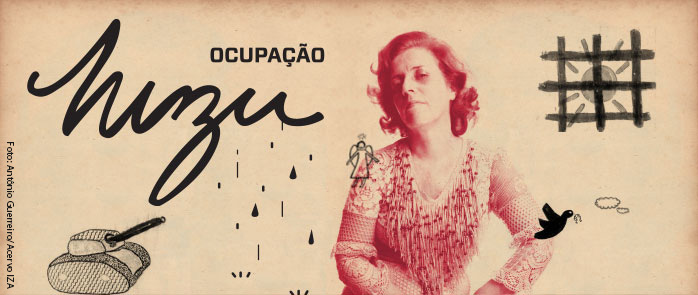
| PRESS KIT |
||
| At Itaú Cultural, Ocupação Zuzu presents an extensive overview of the life and work of one of the most exceptional women in the history of Brazil. |
|
From Thursdays to Sundays, 2 pm to 8 pm
Itaú Cultural Theater (249 places)
2nd Floor (50 seats) Mini course by João Braga, master’s in history of science and specialist in art history and fashion clothing history. He will discuss, among other topics, Zuzu’s output and concepts such as style and fashion.
Zuzu's daughter, social and fashion journalist Hildegard Angel talks in details about the creative process of her mother's main works, their social and cultural contexts and strategies. (*) FILM SERIES: SYNOPSES AND DIRECTOR PROFILES Thursday, April 3rd In the 1960s, the world is in turmoil with all social groups undergoing transformations. In Brazil, designer Zuzu Angel’s career begins to take off while her son Stuart joins the student movement against the military dictatorship then in power. Ideological differences between mother and son run deep. She is a businesswoman. He fights for a socialist revolution, and is arrested, tortured and killed. Thus begins Zuzu's odyssey to free her son and to locate his body, once she discovers he is dead. Her actions reverberate all over Brazil, abroad and in her work. Zuzu’s crusade exposed the inner workings of the repression and, one night, she meets the same fate as her son, in a strange car crash. The opening of a clandestine mass grave found in São Paulo’s Perus Cemetery reveals a hidden past that sheds light on Brazil's recent political history. Hercules 56 (Silvio Da-Rin, Rio de Janeiro, RJ, 2006, 94 min, DVCam) 8 pm Rating: No one under 10 admitted 1970. Brazil and the world seem to be upside down, but 12-year old Mauro's main concern in life has little to do with the military dictatorship that rules the country: his greatest dream is to see Brazil become the three-time world soccer champion. Suddenly, he is separated from his parents and forced to adapt to a strange and amusing community – Bom Retiro, a neighborhood in São Paulo home to Jewish and Italian communities. A moving story of overcoming and solidarity. Friday April 4th Rating: No one under 10 admitted October, 1984. Celso Castro, a journalist with a long history of leftwing militancy, is found dead in the apartment belonging to a former Nazi official. He had broken into the apartment. The police believes it was a suicide. The episode, which seems to come out of a thriller, is the starting point for Flavia, Celso's daughter and the director of the film. She decides to retrace the life and death of the extraordinary man who was her father. It is a journey in time and place: the director returns to Porto Alegre, Santiago, Buenos Aires, Caracas and Paris, backdrops for the family's exile and the illusion and failure of a political project. The result is a powerful and moving documentary that masterly combines police intrigue, commentary from family members and companions and the first person story of a childhood lived between exile and the armed struggle. The intertwined voices of Celso (through his letters) and his daughter create an intimate portrait of a relationship marked by history and absence. 5 pm A former political militant receives an indemnification from the Brazilian government for her husband’s disappearance. He was a victim of the repression during the Brazilian military dictatorship (1964-1985). She can use the money to buy her own apartment and release herself from the suspended reality she has been living for decades, a period in which she was not officially recognized as a widow. When she begins to move into her new home, her husband returns. Their highly emotional meeting forces Vera to reconsider her past. 8 pm Bon-vivant Paulo is always hitting on the beautiful women on the beaches of Rio. One day, this professional womanizer ends up meeting his true love in the form of Maria Alice, a young teacher. He must then face the dilemma of having to give up “all the women in the world” in order to live with just one woman. Through the story of Paulo and Maria Alice, the film illustrates the conflicts between old and new social roles for men and women in the 1960s. Saturday, April 5th An ironic drama about failed utopias, terrorism, sexual behavior and the creation of a myth. A group of friends who fought against the military dictatorship and their children must face the conflict between the present and the past when one of them is dying. A TV and web series made by Itaú Cultural, conceived and produced by Manifesto Impromptu. With five episodes of about 8 minutes each, crônicasNÃOditas is based on representative moments of the dictatorship years. Each episode is a poem of dramatic actions, a small story that is enclosed within itself, always led by a narrator who presents himself under various disguises. These intertwined stories create a mosaic of a time when individual liberties were suspended. Outline of the episodes
1. The Intruder 2. The Meeting 3. The Happening 4.The Stain 5. Pain |
||||||||||||||||||||||||||||||||||||||||||||||||||||||||||||||||||||||||||||||||||||||||||||||||
| BACK |

